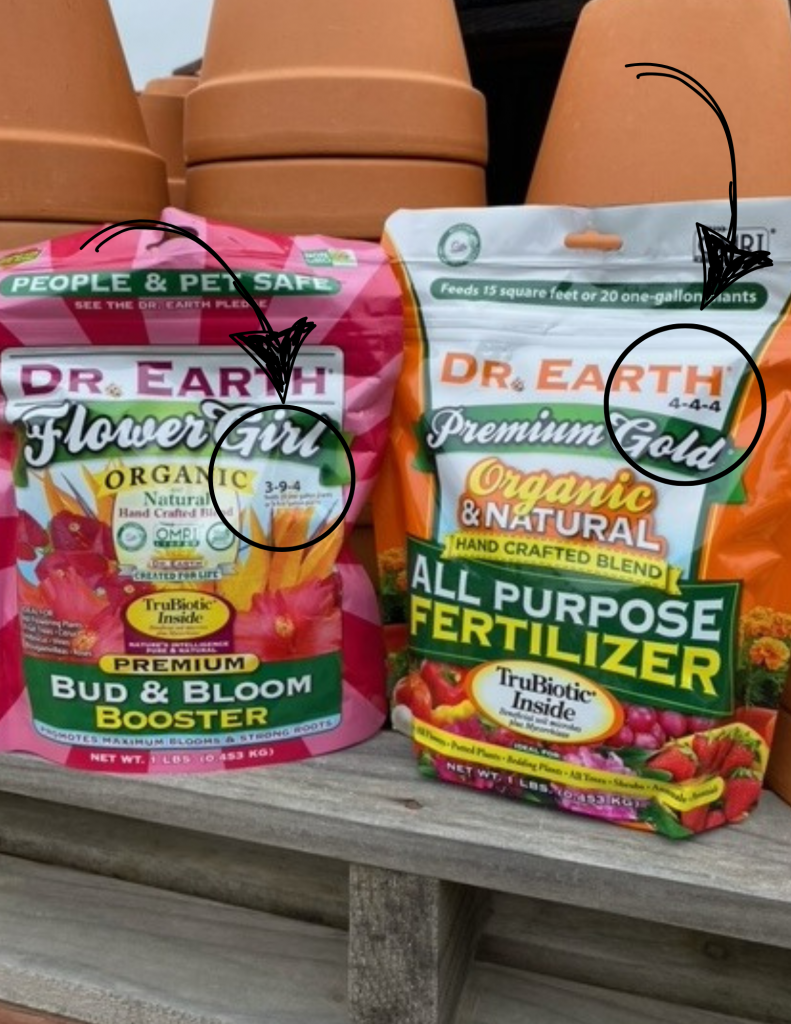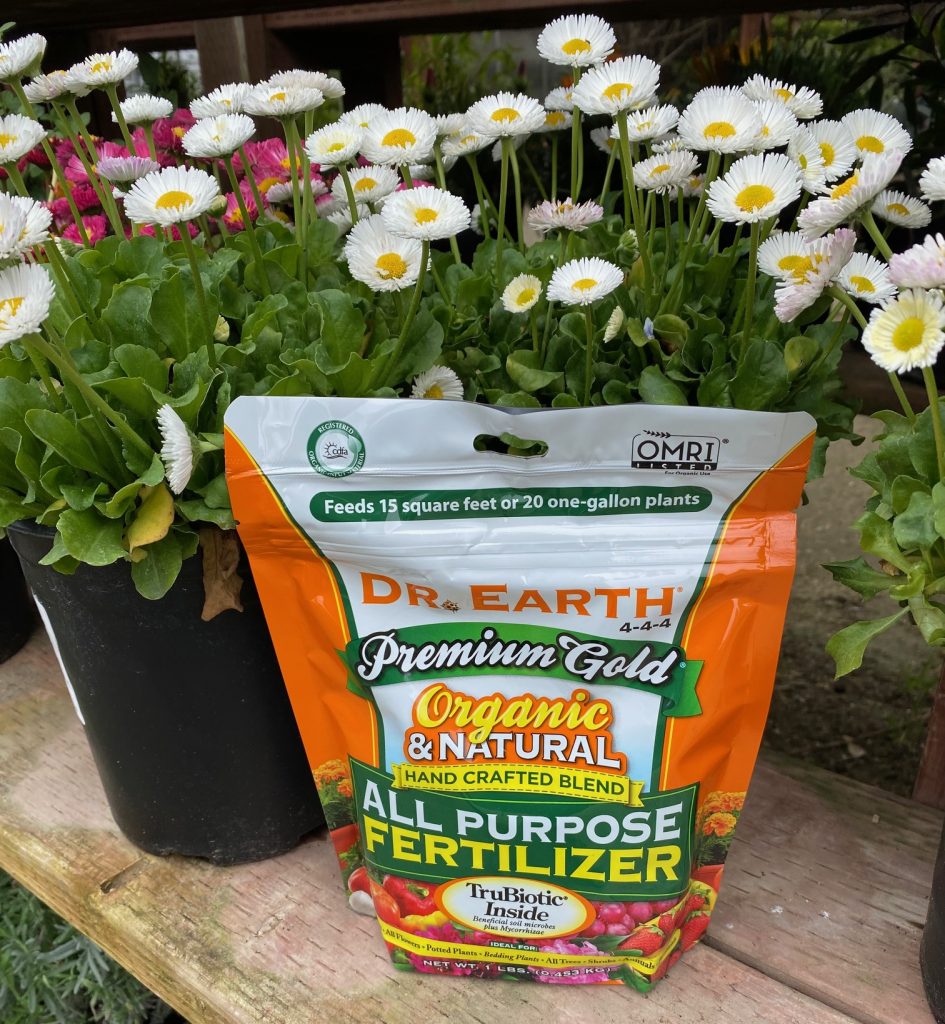Let’s dive deep into the world of fertilizers, exploring how fertilizers work, why choosing organic options can transform your plant game, and also when to apply them. As advocates of sustainable gardening practices, we believe that nurturing our plants with natural, organic fertilizers not only enhances growth but also fosters a healthier ecosystem in our gardens.

Why Organic?
Let’s kick things off by highlighting the advantages of opting for organic fertilizers over synthetic alternatives. Organic fertilizers are derived from naturally occurring sources such as compost, manure, bone meal, and seaweed, making them rich in essential nutrients and beneficial microorganisms. Unlike synthetic fertilizers, which are chemically formulated, organic fertilizers nourish plants gradually, promoting long-term soil health and fertility.
- Environmental Benefits: By choosing organic fertilizers, you’re reducing your environmental footprint. Organic fertilizers are biodegradable and help improve soil structure, water retention, and microbial activity, thus minimizing the risk of chemical runoff and groundwater contamination. Did you know that The Secret Garden is on well water? Groundwater contamination is always something we think about.
- Soil Health: Organic fertilizers replenish the soil with vital nutrients while fostering a diverse ecosystem of beneficial microbes. This creates a balanced environment where plants can thrive naturally, leading to stronger root systems and increased resistance to pests and diseases.
- Sustainable Gardening: Embracing organic fertilizers aligns with our sustainable gardening practices, supporting biodiversity and minimizing the reliance on non-renewable resources. It’s a step towards cultivating gardens that not only flourish but also contribute positively to the surrounding environment.
Decoding the Numbers
Now, let’s unravel the mystery behind those numbers you see on fertilizer packaging. These numbers represent the N-P-K ratio, indicating the percentage of nitrogen (N), phosphorus (P), and potassium (K) present in the fertilizer, respectively.
- Nitrogen (N): Promotes lush green foliage and vigorous growth, ideal for leafy vegetables and annual flowers.
- Phosphorus (P): Essential for root development, flower formation and fruit set, making it vital for blooming plants, fruits, and vegetables.
- Potassium (K): Strengthens plants’ immune systems, enhances disease resistance, and promotes overall plant vigor, suitable for all stages of growth.

An easy way to remember what these N-P-K elements represent is to say “UP, DOWN, & ALL AROUND” in relation to what they each do for the plant. It’s a bit of a misnomer because while Phosphorus is for root development it is also a key factor in flower and fruit development, but the ditty at least gets me thinking in the right direction.
Jasmine
Nitrogen = UP = foliage growth
Phosphorus = DOWN = root development, flower formation and fruit set
Potassium = ALL AROUND = immune system
Finding Balance with Organic Fertilizers
When it comes to organic fertilizers, you might notice something different about those numbers on the packaging—they’re often more evenly balanced and generally lower compared to synthetic options. But why is this the case, and how does it benefit your garden? Let’s delve deeper into this aspect of organic fertilizers.
Organic fertilizers typically feature a more balanced N-P-K ratio, with lower overall percentages compared to their synthetic counterparts. This balanced approach reflects the natural composition of organic materials, where nutrients are released gradually and in harmony with the soil’s microbial activity.

Here’s why this balanced and lower N-P-K ratio is beneficial for your garden:
- Slow-Release Nutrients: Organic fertilizers rely on natural processes to break down organic matter and release nutrients over time. This slow-release mechanism ensures a steady supply of nutrients to plants, reducing the risk of nutrient leaching and minimizing the potential for fertilizer burn.
- Long-Term Soil Health: By providing a balanced array of nutrients in a form that mimics nature, organic fertilizers contribute to the overall health and fertility of the soil. This fosters a sustainable gardening environment where plants can thrive without the need for frequent applications of high-concentration synthetic fertilizers.
- Prevention of Nutrient Imbalance: Synthetic fertilizers often supply nutrients in concentrated forms, which can unfortunately lead to imbalances in the soil and negatively impact plant health. In contrast, the balanced N-P-K ratio of organic fertilizers helps prevent nutrient imbalances, promoting healthier plant growth and resilience to stress.
- Support for Beneficial Microbes: Organic fertilizers not only provide essential nutrients for plants but also support the growth of beneficial soil microorganisms. These microorganisms play a crucial role in nutrient cycling, soil aeration, and disease suppression, further enhancing the overall health of the garden ecosystem.
In essence, the balanced and lower N-P-K ratio of organic fertilizers reflects a holistic approach to plant nutrition and soil health. By working in harmony with nature’s rhythms, organic fertilizers support sustainable gardening practices that prioritize long-term resilience and environmental stewardship.
So the next time you reach for a bag of fertilizer, we hope you’ll choose organic. Then remember that those modest numbers on the label signify more than just nutrient content—they represent a commitment to nurturing your garden in a way that’s gentle on the earth and rewarding for your plants. If you’re shopping with us at The Secret Garden we’ll make the choice easy, since we only sell organic.
Timing Matters
When it comes to organic gardening, timing plays a crucial role in nurturing healthy, vibrant plants while respecting the natural rhythms of the garden. Unlike synthetic fertilizers, which often require strategic applications to boost specific nutrient levels, organic fertilizers offer a more gentle and continuous nourishment approach.
- Monthly Applications During the Growing Season
During the active growing season, regular monthly applications of organic fertilizer provide plants with a steady supply of essential nutrients. By breaking down slowly over time, organic fertilizers release nutrients gradually, ensuring that your plants receive the nourishment they need without overwhelming them or causing nutrient imbalances.
Beginning in early spring as plants emerge from dormancy, kickstart the growing season with an organic fertilizer application to replenish nutrients and support vigorous growth. As the season progresses, continue monthly applications to sustain plant health and encourage lush foliage, robust blooms, and fruitful harvests.
2. Knowing When to Hold Off
While regular fertilization is essential for maintaining plant vitality, there are times when it’s best to hold off on applying fertilizers. For instance:
- High Heat and Drought: During periods of intense heat and drought, plants may experience stress, and applying fertilizer can exacerbate this stress. Instead, focus on providing adequate water and ensuring proper soil moisture levels to support plant resilience.
- Late Fall and Winter: As temperatures cool and plants prepare for dormancy, it’s generally advisable to cease fertilizer applications. Instead, focus on cleaning up the garden, mulching to protect plant roots, and preparing for the winter months ahead.
By tuning in to the seasonal needs of your garden and practicing mindful observation, you can ensure that your organic fertilizer applications align with the rhythms of nature, promoting robust plant growth and overall plant health.
With Spring at the doorstep, it’s a terrific time to pick up a bag of Dr Earth All Purpose Organic Fertilizer. Our wonderful team of experts will be happy to further guide you if you need assistance. Drop us a comment below or stop by the shop today to speak with a sales associate! If you know of someone who would find this information helpful for their own plant journey, please feel free to share!
Happy gardening! 🌿🌻






